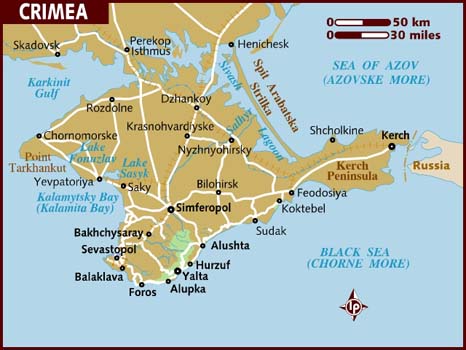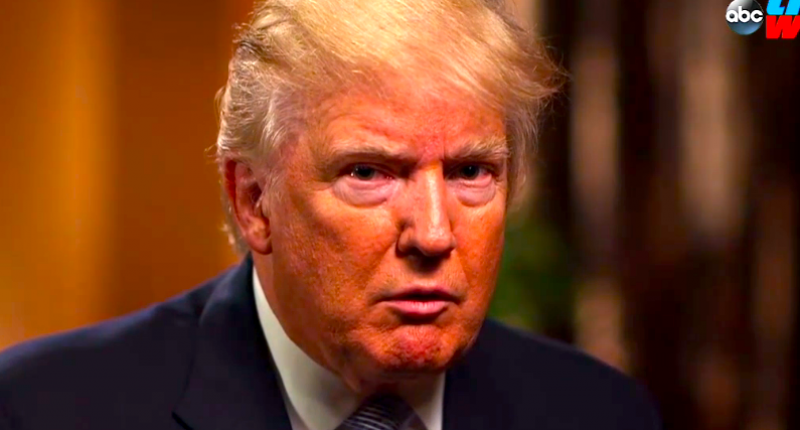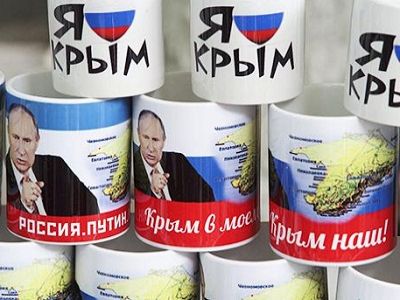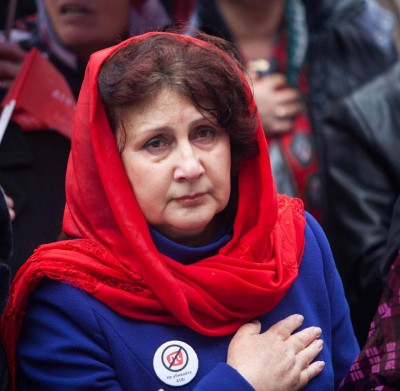Glib Kanevsky, expert at the Center of Political Studies and Analysis
April 1, 2014
The international diplomatic establishment suddenly awakened to the blood-thirsty bear with the revanchist mindset. But this animal is not brutal or dumb. In that, it resembles Hitler’s Germany. In the past, the world gazed surprised as capable German people chose to support a bloody dictator. Here is one answer to the puzzle: the gigantic propaganda machine that is working the minds of the Russians.
“When Crimea suddenly found itself a part of another country, Russia felt not just mugged but robbed clean,” stressed Vladimir Putin and annexed Crimea. The planned bacchanalia at the Kremlin’s St. George Hall may not have happened if the residents of the peninsula boycotted the illegal referendum. It may not have happened if the residents of the peninsula had no desire to join Russia. But they did.
Crimea’s population was scared of the non-existent fascists conjured up by the fiery reports of the Russian media. Kremlin’s propaganda machine won using the old and proven principle: the more audacious the lie, the more people believe it.
As a result of the information war, Crimea has become the Crimean Federal District.
The intensification of propaganda in the Russian Federation was natural. After the failure of the information campaign during the 2008 Georgia war, Putin drew conclusions. He began to create a closed information space, “closed” because the Russian-speaking audiences would hardly be watching the BBC even if its reporting is more impartial.
In June 2009, President Medvedev approved a list of mandatory TV and radio channels which must be aired on the entire territory of the Federation. Certainly, this list included channels repeatedly implicated by media experts in spinning outrageous lies, the First Channel, Rossiya and NTV.
The information expansion was not limited to Russia’s territory. In October 2010, Putin, prime-minister at the time, launched an unprecedented state program “Information Society (2011-2020)” at a total cost of RUB 40.6 bn.
The purpose of the program is to reach all Russian-speakers around the globe through the media, no matter if state-run or private, that share the strategic course of the Russian Federation. Such privileged media must spread “the right kind” of information on events in Russia and the world, increase the share of information about the healthy lifestyle, socially responsible behavior, and spread the traditions, cultural, moral, family values of “the Russian world.”
Much of the program has already been implemented. The spending on the propaganda of the Russian values will have increased to USD 16.5 bn by the end of 2014.
The key participants of the program are:
- the Ministry of Communications and Mass Media of the Russian Federation coordinates the implementation of the “Information Society”;
- Rossvyaz and Rospechat control the development of the Russian media;
- and finally, the infamous censors at the Roskomnadzor and Federal Security Service (FSB) who guard “the purity” of information that contradict Moscow’s official course.
The striking force is the Russian state media which receive huge subsidies from state budget. For example, in 2014, Rospechat will pay USD 721 mln for the programming of the all-Russian state television and broadcasting company (channels Rossiya 1, Rossiya 24, RTR Planeta and others). Rospechat will pay USD 395.7 mln to the non-commercial organization TV-Novosti for broadcasting in English, Arabic and Spanish.
The subsidies to the First Channel, NTV, Petersburg Channel, Karusel Channel and TV-Tsentr will be USD 202 mln. The reformed RIA-Novosti will get USD 86.7 mln, ITAR-TASS - USD 40.8 mln, Sport Broadcasting - USD 56.1 mln and the Public Television of Russia - USD 47.5 mln.
Moreover, Rospechat will give grants to media amounting to USD 2.3 mln and conduct media events for the patriotic upbringing of the citizens to the value of USD 310,000. Incidentally, the Russian taxpayers are paying Roskomnadzor for its censorship work approximately USD 350 mln a year.
It is small wonder that these multi-billion financial injections are effective. The All-Russian state television and broadcasting company reports that it has been covering 98.5% of the Russian population and more than 50 million viewers in the CIS and the Baltic. The RTR-Planeta TV channel is watched in Europe, the Near East, Northern Africa and the US whose residents speak 53 languages combined.
Close ties with the authorities, censorship and pressure have led to the situation where all media on the territory of Russia are now key elements in the massive propaganda machine that have been brainwashing the consumers of their content.
What are they being told? Healthy lifestyle? Russian culture? Yes, but they are also told overt lies about Ukraine and the rest of the world. The Russian media outlets are not shy to twist their facts regardless of journalistic standards. This is propaganda, an imposition of thoughts deemed necessary for the society.

The emphases are placed on the mightiness of Moscow, Putin and the nuclear arsenal. The US, NATO, the EU are portrayed as enemies and saboteurs. Those people who dare to express different thinking on Russian TV are humiliated on the stop. Putin’s program has been accomplished as effectively as Goebbels’s propaganda in the past. The Russian-speaking population has been sure (with meager exceptions) that the Banderites have been killing people right on the streets of Ukraine and one cannot say hello in Russian.
The Ukrainian people are shocked at such news. But this is our world today. The truth it is not what you have seen with own eyes and experienced first hand. The truth is what you have been told on TV.
Ukraine’s informational weakness
How does Ukraine fare against the multi-billion budgets and the Russian propaganda machine? Our country proved its weakness in many spheres, particularly in when it comes to information. And here are the objective indicators of this weakness.
Putin’s “Information Society (2011-2020)” program has funding of USD 4.06 bn per year. Just for comparison, Ukraine’s entire 2013 national budget expected an revenue of UAH 351.2 bn or USD 43.35 bn at the exchange rate of UAH 8.1 to a dollar. In other words, Putin’s spending on propaganda amounts to 10% Ukraine’s national revenue.
In 2013, the State Broadcasting Committee of Ukraine received UAH 711 mln from the state. The Bulk of this money goes to running costs and only a small portion will be spent on yet another segment about the great Taras Shevchenko.
We found some indicators that could be at least remotely related to the establishment of Ukraine’s own information space. UAH 297 mln was earmarked in 2013 for the organizational, analytical and material support of the Verkhovna Rada. Likewise, UAH 296 mln was earmarked for the organizational, analytical and material support of the President of Ukraine and President’s Administration and another UAH 282 mln of similar support for the Cabinet of Ministers and government’s “Uryadovyi Kurier” newspaper.
Ukraine’s government spent UAH 35.6 mln on the National Commission regulating communications and IT. UAH 124 mln was spent to provide analysis and coordination in the sphere of national security and defense (for the needs of the National Security and Defense Council).
Summing up all figures we get UAH 1.745 bn or USD 215 million. That is, Ukraine spent on propaganda 18.7 times less than Russia in 2013. Here is one more comparison. According to Russian statistics agency Rosstat, at the beginning of 2014, Russia’s population was 143.7 million. Ukraine’s population was at 45.4 million at the beginning of 2014. This means that Russian information expenditure was USD 27.8 per person, while in Ukraine – only USD 4.7.
What can be said in Ukraine’s defense? Russia’s GDP is 18.5 times larger than Ukrainian. As a share of GDP, we have been spending about the same as Russia. But the crux of the problem is not the amount of spending itself. What matters is the direction of the national information policy. Shevchenko, snails, butterflies, Cossacks and WWI Sich Riflemen, Hrushevskyi, students at Kruty, that is all good but how does it help to create information space of modern Ukraine?
Clearly, Viktor Yanukovych’s regime had no interest in creating the information space of Ukraine as a state. The greatest achievement of the previous authorities was their trailers in favor of the European choice for Ukraine launched in mid-2013 and then, two months later, backtracking toward Russia.
With plenty of opportunities to create Ukraine’s information space, Yanukovych destroyed what little remained of the trust to the state media. His oligarch-controlled media outlets slipped into the good old habit of protecting their owners from authorities.
This is the battle Ukraine lost.
In 2001, 29.59% of Ukraine’s inhabitants said that Russian is their native language. Assuming that today’s number remains the same, we have 13.4 million Russian-speakers. We add this to Russia’s population and we get 157 million people. The expenditure on propaganda per person will be USD 25.5. This indicator Ukrainian authorities should heed. It explains why Ukraine lost Crimea and is not capable to maintain control over Donbas and the South.
The time has come to change the weakness of the Ukrainian authorities and begin establishing our own information policy. Today, this issue is once again becoming less important than social spending and the upcoming presidential elections. Once again, our media are more focused on digging up dirt on Yulia Tymoshenko, Vitaliy Klichko, Petro Poroshenko.
This leads to a dangerous complacency: the information space is not a struggle for power but a national policy. Ukraine may end up playing with its own territory for skimping on information policy and disregarding its national interests.
Source: http://www.epravda.com.ua/publications/2014/04/1/433089/
Translated by Anatoliy Shara, edited by Mariana Budjeryn




